LMMB037 Business and Sustainability: An Ethics and Globalization Essay
VerifiedAdded on 2023/03/23
|17
|4854
|51
Essay
AI Summary
This essay delves into the interconnected concepts of business sustainability and ethics, emphasizing the crucial role of consumers as stakeholders. It explores how businesses that negatively impact the environment or society are considered unsustainable, while ethical businesses align with human rights and prioritize environmental principles. The essay examines the core principles of business ethics, including utilitarianism, deontology, and virtue ethics, and how these relate to sustainability. It then discusses the impact of globalization on business ethics and sustainability, highlighting the importance of ethical practices in international operations. Further, it explores corporate social responsibility (CSR) as a form of self-regulation and its alignment with business ethics. The essay concludes by analyzing stakeholder theory, emphasizing the need for businesses to consider the interests of all stakeholders, including employees, customers, and the community, for long-term success and sustainability. The essay highlights how businesses can create a positive impact by providing job opportunities, strengthening communities, and driving innovations.
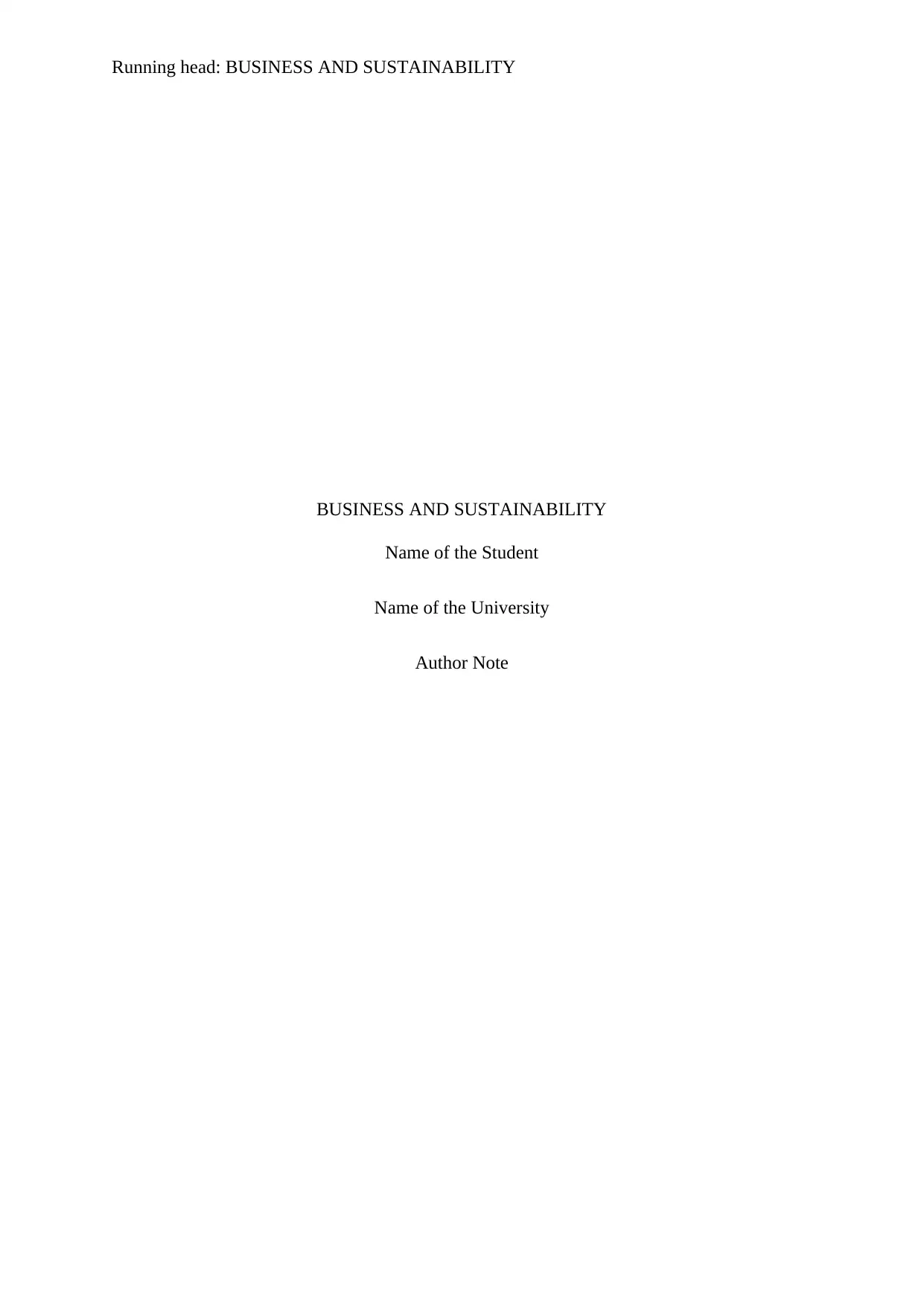
Running head: BUSINESS AND SUSTAINABILITY
BUSINESS AND SUSTAINABILITY
Name of the Student
Name of the University
Author Note
BUSINESS AND SUSTAINABILITY
Name of the Student
Name of the University
Author Note
Paraphrase This Document
Need a fresh take? Get an instant paraphrase of this document with our AI Paraphraser
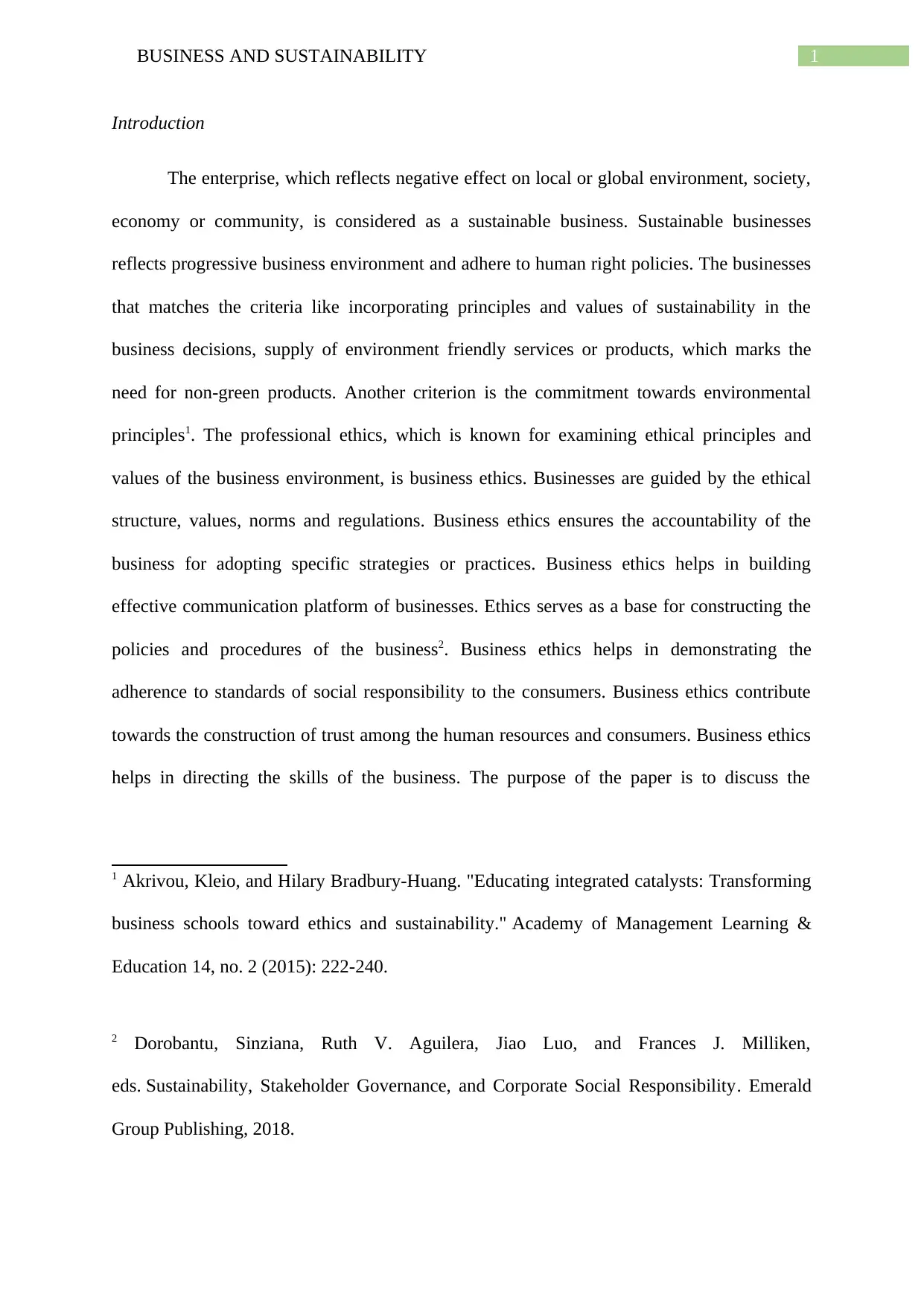
1BUSINESS AND SUSTAINABILITY
Introduction
The enterprise, which reflects negative effect on local or global environment, society,
economy or community, is considered as a sustainable business. Sustainable businesses
reflects progressive business environment and adhere to human right policies. The businesses
that matches the criteria like incorporating principles and values of sustainability in the
business decisions, supply of environment friendly services or products, which marks the
need for non-green products. Another criterion is the commitment towards environmental
principles1. The professional ethics, which is known for examining ethical principles and
values of the business environment, is business ethics. Businesses are guided by the ethical
structure, values, norms and regulations. Business ethics ensures the accountability of the
business for adopting specific strategies or practices. Business ethics helps in building
effective communication platform of businesses. Ethics serves as a base for constructing the
policies and procedures of the business2. Business ethics helps in demonstrating the
adherence to standards of social responsibility to the consumers. Business ethics contribute
towards the construction of trust among the human resources and consumers. Business ethics
helps in directing the skills of the business. The purpose of the paper is to discuss the
1 Akrivou, Kleio, and Hilary Bradbury-Huang. "Educating integrated catalysts: Transforming
business schools toward ethics and sustainability." Academy of Management Learning &
Education 14, no. 2 (2015): 222-240.
2 Dorobantu, Sinziana, Ruth V. Aguilera, Jiao Luo, and Frances J. Milliken,
eds. Sustainability, Stakeholder Governance, and Corporate Social Responsibility. Emerald
Group Publishing, 2018.
Introduction
The enterprise, which reflects negative effect on local or global environment, society,
economy or community, is considered as a sustainable business. Sustainable businesses
reflects progressive business environment and adhere to human right policies. The businesses
that matches the criteria like incorporating principles and values of sustainability in the
business decisions, supply of environment friendly services or products, which marks the
need for non-green products. Another criterion is the commitment towards environmental
principles1. The professional ethics, which is known for examining ethical principles and
values of the business environment, is business ethics. Businesses are guided by the ethical
structure, values, norms and regulations. Business ethics ensures the accountability of the
business for adopting specific strategies or practices. Business ethics helps in building
effective communication platform of businesses. Ethics serves as a base for constructing the
policies and procedures of the business2. Business ethics helps in demonstrating the
adherence to standards of social responsibility to the consumers. Business ethics contribute
towards the construction of trust among the human resources and consumers. Business ethics
helps in directing the skills of the business. The purpose of the paper is to discuss the
1 Akrivou, Kleio, and Hilary Bradbury-Huang. "Educating integrated catalysts: Transforming
business schools toward ethics and sustainability." Academy of Management Learning &
Education 14, no. 2 (2015): 222-240.
2 Dorobantu, Sinziana, Ruth V. Aguilera, Jiao Luo, and Frances J. Milliken,
eds. Sustainability, Stakeholder Governance, and Corporate Social Responsibility. Emerald
Group Publishing, 2018.
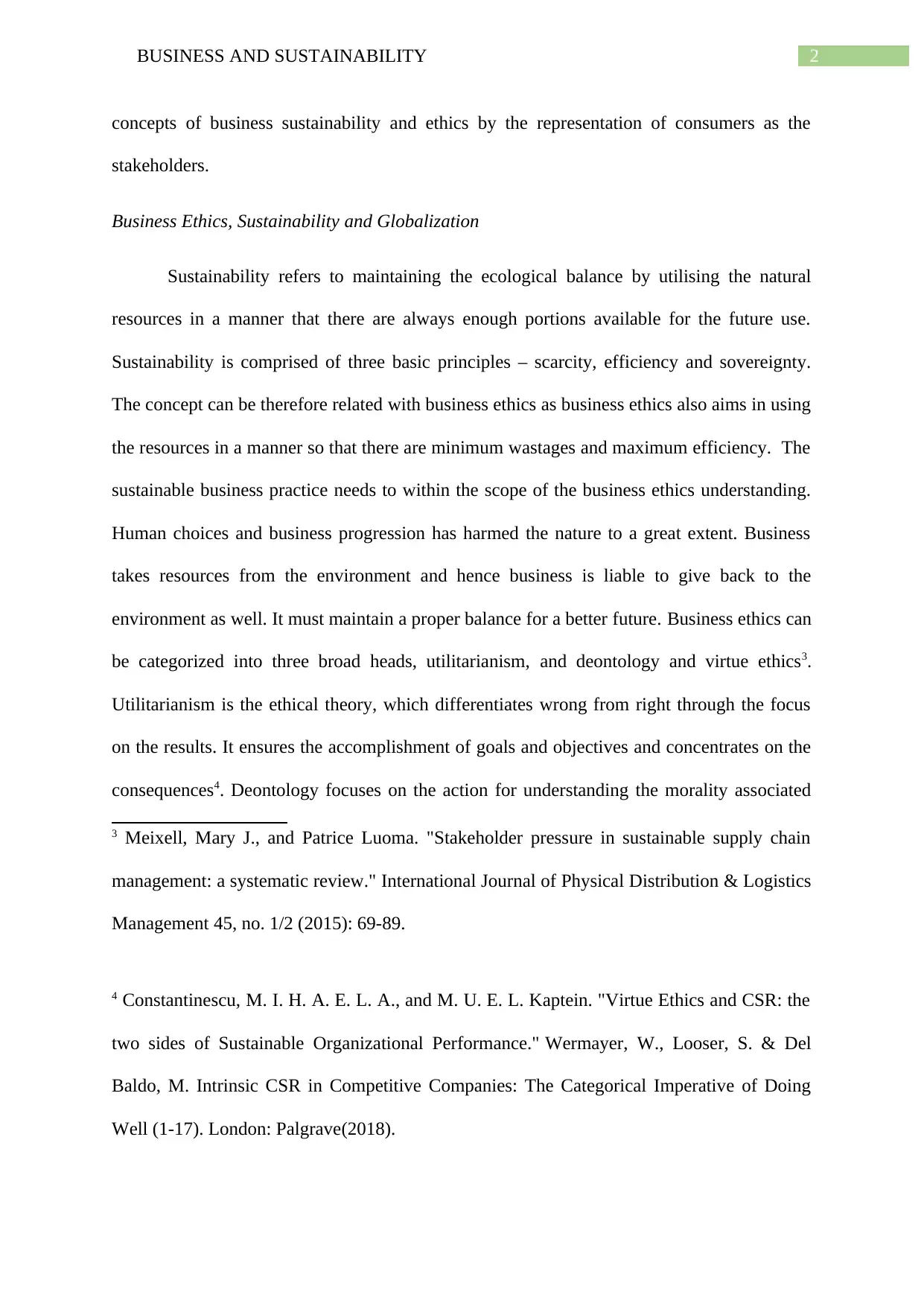
2BUSINESS AND SUSTAINABILITY
concepts of business sustainability and ethics by the representation of consumers as the
stakeholders.
Business Ethics, Sustainability and Globalization
Sustainability refers to maintaining the ecological balance by utilising the natural
resources in a manner that there are always enough portions available for the future use.
Sustainability is comprised of three basic principles – scarcity, efficiency and sovereignty.
The concept can be therefore related with business ethics as business ethics also aims in using
the resources in a manner so that there are minimum wastages and maximum efficiency. The
sustainable business practice needs to within the scope of the business ethics understanding.
Human choices and business progression has harmed the nature to a great extent. Business
takes resources from the environment and hence business is liable to give back to the
environment as well. It must maintain a proper balance for a better future. Business ethics can
be categorized into three broad heads, utilitarianism, and deontology and virtue ethics3.
Utilitarianism is the ethical theory, which differentiates wrong from right through the focus
on the results. It ensures the accomplishment of goals and objectives and concentrates on the
consequences4. Deontology focuses on the action for understanding the morality associated
3 Meixell, Mary J., and Patrice Luoma. "Stakeholder pressure in sustainable supply chain
management: a systematic review." International Journal of Physical Distribution & Logistics
Management 45, no. 1/2 (2015): 69-89.
4 Constantinescu, M. I. H. A. E. L. A., and M. U. E. L. Kaptein. "Virtue Ethics and CSR: the
two sides of Sustainable Organizational Performance." Wermayer, W., Looser, S. & Del
Baldo, M. Intrinsic CSR in Competitive Companies: The Categorical Imperative of Doing
Well (1-17). London: Palgrave(2018).
concepts of business sustainability and ethics by the representation of consumers as the
stakeholders.
Business Ethics, Sustainability and Globalization
Sustainability refers to maintaining the ecological balance by utilising the natural
resources in a manner that there are always enough portions available for the future use.
Sustainability is comprised of three basic principles – scarcity, efficiency and sovereignty.
The concept can be therefore related with business ethics as business ethics also aims in using
the resources in a manner so that there are minimum wastages and maximum efficiency. The
sustainable business practice needs to within the scope of the business ethics understanding.
Human choices and business progression has harmed the nature to a great extent. Business
takes resources from the environment and hence business is liable to give back to the
environment as well. It must maintain a proper balance for a better future. Business ethics can
be categorized into three broad heads, utilitarianism, and deontology and virtue ethics3.
Utilitarianism is the ethical theory, which differentiates wrong from right through the focus
on the results. It ensures the accomplishment of goals and objectives and concentrates on the
consequences4. Deontology focuses on the action for understanding the morality associated
3 Meixell, Mary J., and Patrice Luoma. "Stakeholder pressure in sustainable supply chain
management: a systematic review." International Journal of Physical Distribution & Logistics
Management 45, no. 1/2 (2015): 69-89.
4 Constantinescu, M. I. H. A. E. L. A., and M. U. E. L. Kaptein. "Virtue Ethics and CSR: the
two sides of Sustainable Organizational Performance." Wermayer, W., Looser, S. & Del
Baldo, M. Intrinsic CSR in Competitive Companies: The Categorical Imperative of Doing
Well (1-17). London: Palgrave(2018).
⊘ This is a preview!⊘
Do you want full access?
Subscribe today to unlock all pages.

Trusted by 1+ million students worldwide
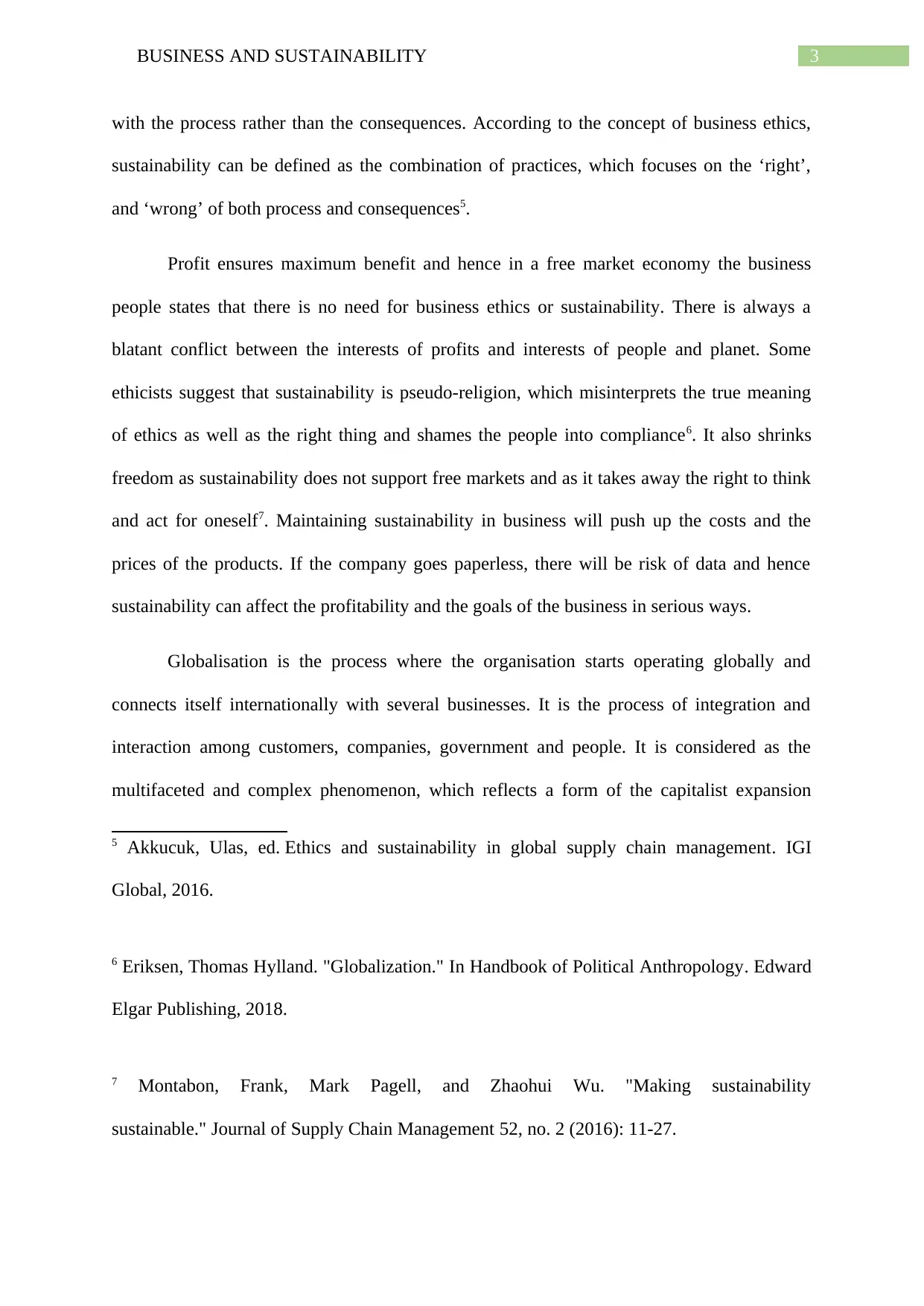
3BUSINESS AND SUSTAINABILITY
with the process rather than the consequences. According to the concept of business ethics,
sustainability can be defined as the combination of practices, which focuses on the ‘right’,
and ‘wrong’ of both process and consequences5.
Profit ensures maximum benefit and hence in a free market economy the business
people states that there is no need for business ethics or sustainability. There is always a
blatant conflict between the interests of profits and interests of people and planet. Some
ethicists suggest that sustainability is pseudo-religion, which misinterprets the true meaning
of ethics as well as the right thing and shames the people into compliance6. It also shrinks
freedom as sustainability does not support free markets and as it takes away the right to think
and act for oneself7. Maintaining sustainability in business will push up the costs and the
prices of the products. If the company goes paperless, there will be risk of data and hence
sustainability can affect the profitability and the goals of the business in serious ways.
Globalisation is the process where the organisation starts operating globally and
connects itself internationally with several businesses. It is the process of integration and
interaction among customers, companies, government and people. It is considered as the
multifaceted and complex phenomenon, which reflects a form of the capitalist expansion
5 Akkucuk, Ulas, ed. Ethics and sustainability in global supply chain management. IGI
Global, 2016.
6 Eriksen, Thomas Hylland. "Globalization." In Handbook of Political Anthropology. Edward
Elgar Publishing, 2018.
7 Montabon, Frank, Mark Pagell, and Zhaohui Wu. "Making sustainability
sustainable." Journal of Supply Chain Management 52, no. 2 (2016): 11-27.
with the process rather than the consequences. According to the concept of business ethics,
sustainability can be defined as the combination of practices, which focuses on the ‘right’,
and ‘wrong’ of both process and consequences5.
Profit ensures maximum benefit and hence in a free market economy the business
people states that there is no need for business ethics or sustainability. There is always a
blatant conflict between the interests of profits and interests of people and planet. Some
ethicists suggest that sustainability is pseudo-religion, which misinterprets the true meaning
of ethics as well as the right thing and shames the people into compliance6. It also shrinks
freedom as sustainability does not support free markets and as it takes away the right to think
and act for oneself7. Maintaining sustainability in business will push up the costs and the
prices of the products. If the company goes paperless, there will be risk of data and hence
sustainability can affect the profitability and the goals of the business in serious ways.
Globalisation is the process where the organisation starts operating globally and
connects itself internationally with several businesses. It is the process of integration and
interaction among customers, companies, government and people. It is considered as the
multifaceted and complex phenomenon, which reflects a form of the capitalist expansion
5 Akkucuk, Ulas, ed. Ethics and sustainability in global supply chain management. IGI
Global, 2016.
6 Eriksen, Thomas Hylland. "Globalization." In Handbook of Political Anthropology. Edward
Elgar Publishing, 2018.
7 Montabon, Frank, Mark Pagell, and Zhaohui Wu. "Making sustainability
sustainable." Journal of Supply Chain Management 52, no. 2 (2016): 11-27.
Paraphrase This Document
Need a fresh take? Get an instant paraphrase of this document with our AI Paraphraser
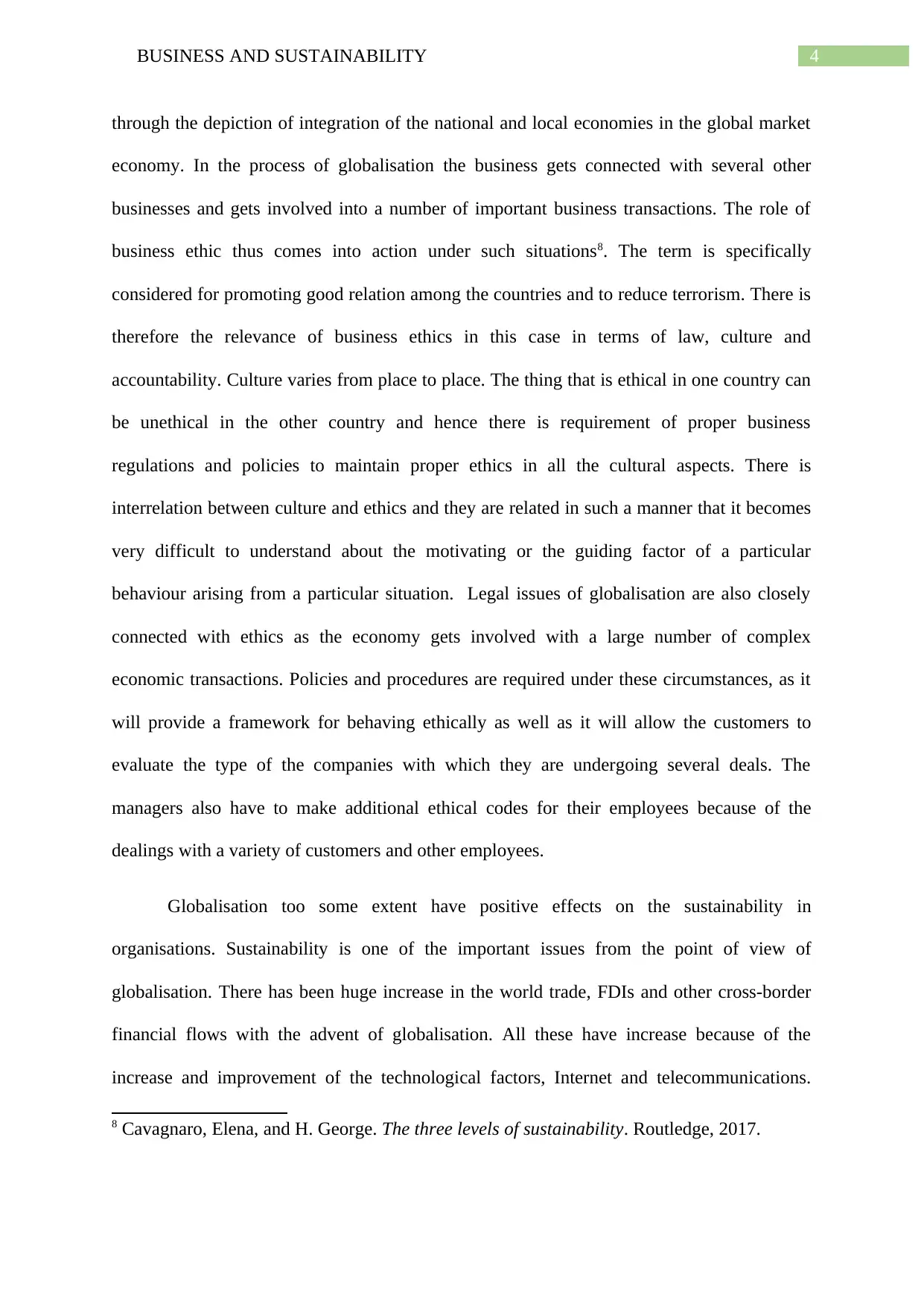
4BUSINESS AND SUSTAINABILITY
through the depiction of integration of the national and local economies in the global market
economy. In the process of globalisation the business gets connected with several other
businesses and gets involved into a number of important business transactions. The role of
business ethic thus comes into action under such situations8. The term is specifically
considered for promoting good relation among the countries and to reduce terrorism. There is
therefore the relevance of business ethics in this case in terms of law, culture and
accountability. Culture varies from place to place. The thing that is ethical in one country can
be unethical in the other country and hence there is requirement of proper business
regulations and policies to maintain proper ethics in all the cultural aspects. There is
interrelation between culture and ethics and they are related in such a manner that it becomes
very difficult to understand about the motivating or the guiding factor of a particular
behaviour arising from a particular situation. Legal issues of globalisation are also closely
connected with ethics as the economy gets involved with a large number of complex
economic transactions. Policies and procedures are required under these circumstances, as it
will provide a framework for behaving ethically as well as it will allow the customers to
evaluate the type of the companies with which they are undergoing several deals. The
managers also have to make additional ethical codes for their employees because of the
dealings with a variety of customers and other employees.
Globalisation too some extent have positive effects on the sustainability in
organisations. Sustainability is one of the important issues from the point of view of
globalisation. There has been huge increase in the world trade, FDIs and other cross-border
financial flows with the advent of globalisation. All these have increase because of the
increase and improvement of the technological factors, Internet and telecommunications.
8 Cavagnaro, Elena, and H. George. The three levels of sustainability. Routledge, 2017.
through the depiction of integration of the national and local economies in the global market
economy. In the process of globalisation the business gets connected with several other
businesses and gets involved into a number of important business transactions. The role of
business ethic thus comes into action under such situations8. The term is specifically
considered for promoting good relation among the countries and to reduce terrorism. There is
therefore the relevance of business ethics in this case in terms of law, culture and
accountability. Culture varies from place to place. The thing that is ethical in one country can
be unethical in the other country and hence there is requirement of proper business
regulations and policies to maintain proper ethics in all the cultural aspects. There is
interrelation between culture and ethics and they are related in such a manner that it becomes
very difficult to understand about the motivating or the guiding factor of a particular
behaviour arising from a particular situation. Legal issues of globalisation are also closely
connected with ethics as the economy gets involved with a large number of complex
economic transactions. Policies and procedures are required under these circumstances, as it
will provide a framework for behaving ethically as well as it will allow the customers to
evaluate the type of the companies with which they are undergoing several deals. The
managers also have to make additional ethical codes for their employees because of the
dealings with a variety of customers and other employees.
Globalisation too some extent have positive effects on the sustainability in
organisations. Sustainability is one of the important issues from the point of view of
globalisation. There has been huge increase in the world trade, FDIs and other cross-border
financial flows with the advent of globalisation. All these have increase because of the
increase and improvement of the technological factors, Internet and telecommunications.
8 Cavagnaro, Elena, and H. George. The three levels of sustainability. Routledge, 2017.
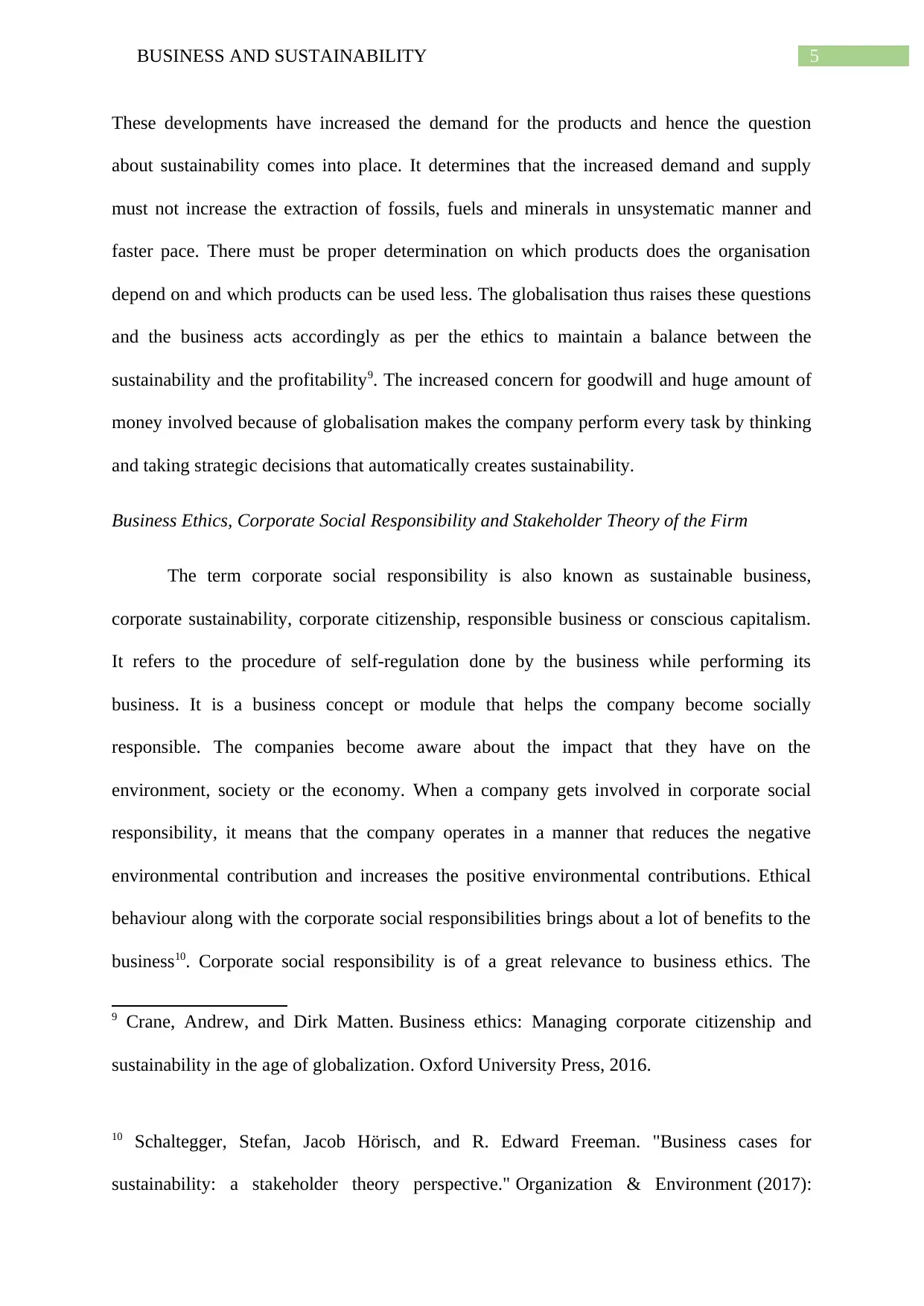
5BUSINESS AND SUSTAINABILITY
These developments have increased the demand for the products and hence the question
about sustainability comes into place. It determines that the increased demand and supply
must not increase the extraction of fossils, fuels and minerals in unsystematic manner and
faster pace. There must be proper determination on which products does the organisation
depend on and which products can be used less. The globalisation thus raises these questions
and the business acts accordingly as per the ethics to maintain a balance between the
sustainability and the profitability9. The increased concern for goodwill and huge amount of
money involved because of globalisation makes the company perform every task by thinking
and taking strategic decisions that automatically creates sustainability.
Business Ethics, Corporate Social Responsibility and Stakeholder Theory of the Firm
The term corporate social responsibility is also known as sustainable business,
corporate sustainability, corporate citizenship, responsible business or conscious capitalism.
It refers to the procedure of self-regulation done by the business while performing its
business. It is a business concept or module that helps the company become socially
responsible. The companies become aware about the impact that they have on the
environment, society or the economy. When a company gets involved in corporate social
responsibility, it means that the company operates in a manner that reduces the negative
environmental contribution and increases the positive environmental contributions. Ethical
behaviour along with the corporate social responsibilities brings about a lot of benefits to the
business10. Corporate social responsibility is of a great relevance to business ethics. The
9 Crane, Andrew, and Dirk Matten. Business ethics: Managing corporate citizenship and
sustainability in the age of globalization. Oxford University Press, 2016.
10 Schaltegger, Stefan, Jacob Hörisch, and R. Edward Freeman. "Business cases for
sustainability: a stakeholder theory perspective." Organization & Environment (2017):
These developments have increased the demand for the products and hence the question
about sustainability comes into place. It determines that the increased demand and supply
must not increase the extraction of fossils, fuels and minerals in unsystematic manner and
faster pace. There must be proper determination on which products does the organisation
depend on and which products can be used less. The globalisation thus raises these questions
and the business acts accordingly as per the ethics to maintain a balance between the
sustainability and the profitability9. The increased concern for goodwill and huge amount of
money involved because of globalisation makes the company perform every task by thinking
and taking strategic decisions that automatically creates sustainability.
Business Ethics, Corporate Social Responsibility and Stakeholder Theory of the Firm
The term corporate social responsibility is also known as sustainable business,
corporate sustainability, corporate citizenship, responsible business or conscious capitalism.
It refers to the procedure of self-regulation done by the business while performing its
business. It is a business concept or module that helps the company become socially
responsible. The companies become aware about the impact that they have on the
environment, society or the economy. When a company gets involved in corporate social
responsibility, it means that the company operates in a manner that reduces the negative
environmental contribution and increases the positive environmental contributions. Ethical
behaviour along with the corporate social responsibilities brings about a lot of benefits to the
business10. Corporate social responsibility is of a great relevance to business ethics. The
9 Crane, Andrew, and Dirk Matten. Business ethics: Managing corporate citizenship and
sustainability in the age of globalization. Oxford University Press, 2016.
10 Schaltegger, Stefan, Jacob Hörisch, and R. Edward Freeman. "Business cases for
sustainability: a stakeholder theory perspective." Organization & Environment (2017):
⊘ This is a preview!⊘
Do you want full access?
Subscribe today to unlock all pages.

Trusted by 1+ million students worldwide
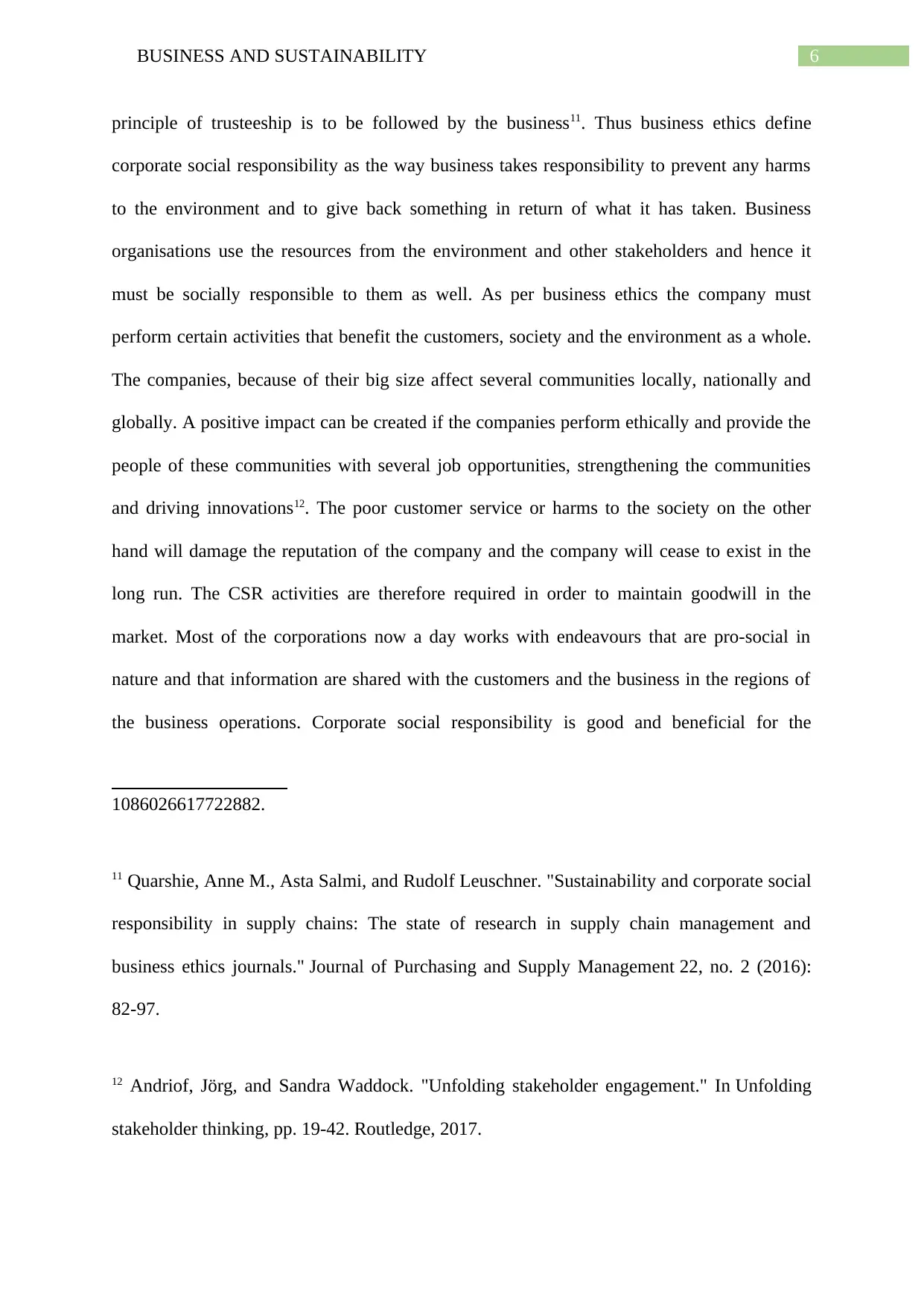
6BUSINESS AND SUSTAINABILITY
principle of trusteeship is to be followed by the business11. Thus business ethics define
corporate social responsibility as the way business takes responsibility to prevent any harms
to the environment and to give back something in return of what it has taken. Business
organisations use the resources from the environment and other stakeholders and hence it
must be socially responsible to them as well. As per business ethics the company must
perform certain activities that benefit the customers, society and the environment as a whole.
The companies, because of their big size affect several communities locally, nationally and
globally. A positive impact can be created if the companies perform ethically and provide the
people of these communities with several job opportunities, strengthening the communities
and driving innovations12. The poor customer service or harms to the society on the other
hand will damage the reputation of the company and the company will cease to exist in the
long run. The CSR activities are therefore required in order to maintain goodwill in the
market. Most of the corporations now a day works with endeavours that are pro-social in
nature and that information are shared with the customers and the business in the regions of
the business operations. Corporate social responsibility is good and beneficial for the
1086026617722882.
11 Quarshie, Anne M., Asta Salmi, and Rudolf Leuschner. "Sustainability and corporate social
responsibility in supply chains: The state of research in supply chain management and
business ethics journals." Journal of Purchasing and Supply Management 22, no. 2 (2016):
82-97.
12 Andriof, Jörg, and Sandra Waddock. "Unfolding stakeholder engagement." In Unfolding
stakeholder thinking, pp. 19-42. Routledge, 2017.
principle of trusteeship is to be followed by the business11. Thus business ethics define
corporate social responsibility as the way business takes responsibility to prevent any harms
to the environment and to give back something in return of what it has taken. Business
organisations use the resources from the environment and other stakeholders and hence it
must be socially responsible to them as well. As per business ethics the company must
perform certain activities that benefit the customers, society and the environment as a whole.
The companies, because of their big size affect several communities locally, nationally and
globally. A positive impact can be created if the companies perform ethically and provide the
people of these communities with several job opportunities, strengthening the communities
and driving innovations12. The poor customer service or harms to the society on the other
hand will damage the reputation of the company and the company will cease to exist in the
long run. The CSR activities are therefore required in order to maintain goodwill in the
market. Most of the corporations now a day works with endeavours that are pro-social in
nature and that information are shared with the customers and the business in the regions of
the business operations. Corporate social responsibility is good and beneficial for the
1086026617722882.
11 Quarshie, Anne M., Asta Salmi, and Rudolf Leuschner. "Sustainability and corporate social
responsibility in supply chains: The state of research in supply chain management and
business ethics journals." Journal of Purchasing and Supply Management 22, no. 2 (2016):
82-97.
12 Andriof, Jörg, and Sandra Waddock. "Unfolding stakeholder engagement." In Unfolding
stakeholder thinking, pp. 19-42. Routledge, 2017.
Paraphrase This Document
Need a fresh take? Get an instant paraphrase of this document with our AI Paraphraser
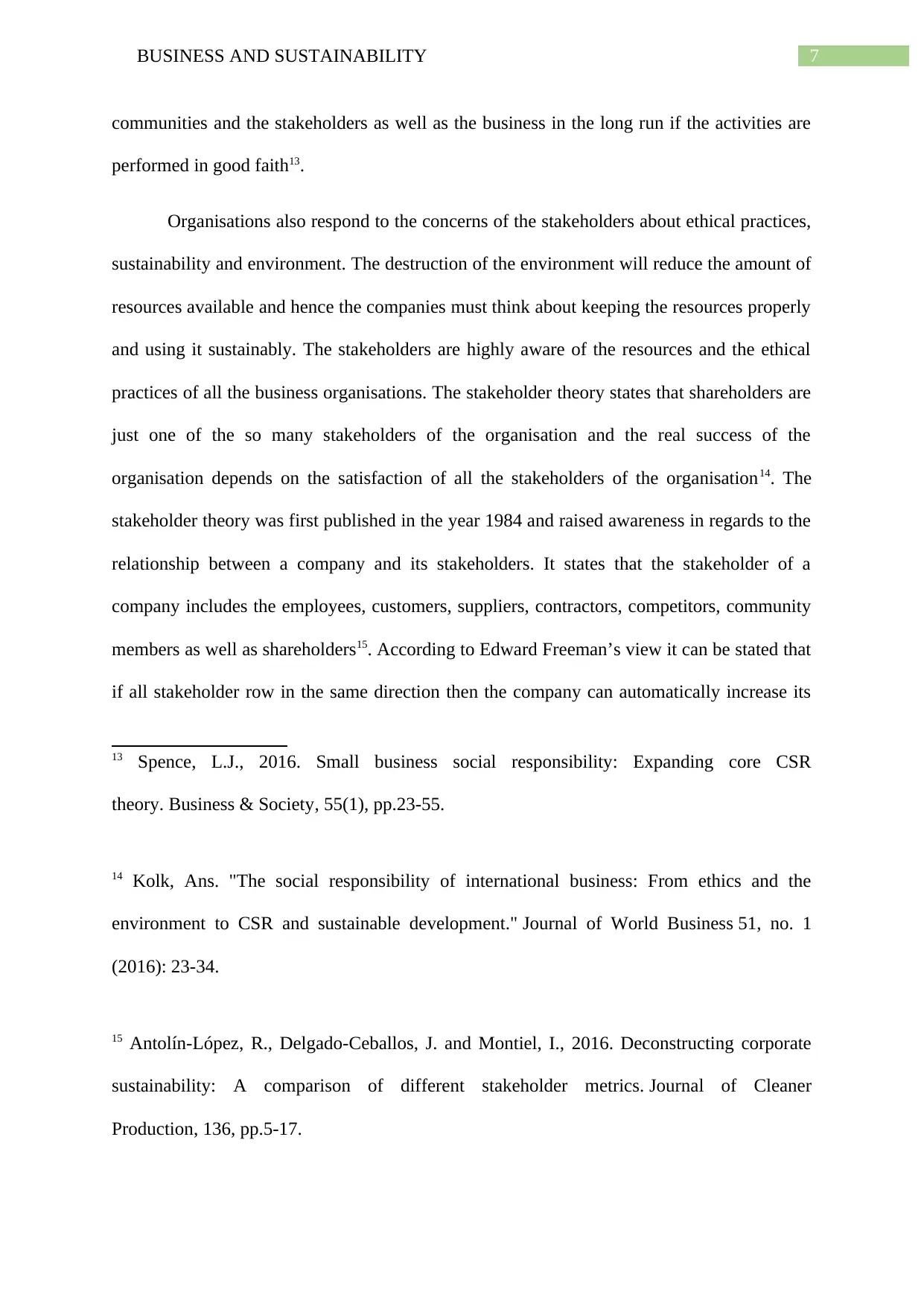
7BUSINESS AND SUSTAINABILITY
communities and the stakeholders as well as the business in the long run if the activities are
performed in good faith13.
Organisations also respond to the concerns of the stakeholders about ethical practices,
sustainability and environment. The destruction of the environment will reduce the amount of
resources available and hence the companies must think about keeping the resources properly
and using it sustainably. The stakeholders are highly aware of the resources and the ethical
practices of all the business organisations. The stakeholder theory states that shareholders are
just one of the so many stakeholders of the organisation and the real success of the
organisation depends on the satisfaction of all the stakeholders of the organisation14. The
stakeholder theory was first published in the year 1984 and raised awareness in regards to the
relationship between a company and its stakeholders. It states that the stakeholder of a
company includes the employees, customers, suppliers, contractors, competitors, community
members as well as shareholders15. According to Edward Freeman’s view it can be stated that
if all stakeholder row in the same direction then the company can automatically increase its
13 Spence, L.J., 2016. Small business social responsibility: Expanding core CSR
theory. Business & Society, 55(1), pp.23-55.
14 Kolk, Ans. "The social responsibility of international business: From ethics and the
environment to CSR and sustainable development." Journal of World Business 51, no. 1
(2016): 23-34.
15 Antolín-López, R., Delgado-Ceballos, J. and Montiel, I., 2016. Deconstructing corporate
sustainability: A comparison of different stakeholder metrics. Journal of Cleaner
Production, 136, pp.5-17.
communities and the stakeholders as well as the business in the long run if the activities are
performed in good faith13.
Organisations also respond to the concerns of the stakeholders about ethical practices,
sustainability and environment. The destruction of the environment will reduce the amount of
resources available and hence the companies must think about keeping the resources properly
and using it sustainably. The stakeholders are highly aware of the resources and the ethical
practices of all the business organisations. The stakeholder theory states that shareholders are
just one of the so many stakeholders of the organisation and the real success of the
organisation depends on the satisfaction of all the stakeholders of the organisation14. The
stakeholder theory was first published in the year 1984 and raised awareness in regards to the
relationship between a company and its stakeholders. It states that the stakeholder of a
company includes the employees, customers, suppliers, contractors, competitors, community
members as well as shareholders15. According to Edward Freeman’s view it can be stated that
if all stakeholder row in the same direction then the company can automatically increase its
13 Spence, L.J., 2016. Small business social responsibility: Expanding core CSR
theory. Business & Society, 55(1), pp.23-55.
14 Kolk, Ans. "The social responsibility of international business: From ethics and the
environment to CSR and sustainable development." Journal of World Business 51, no. 1
(2016): 23-34.
15 Antolín-López, R., Delgado-Ceballos, J. and Montiel, I., 2016. Deconstructing corporate
sustainability: A comparison of different stakeholder metrics. Journal of Cleaner
Production, 136, pp.5-17.
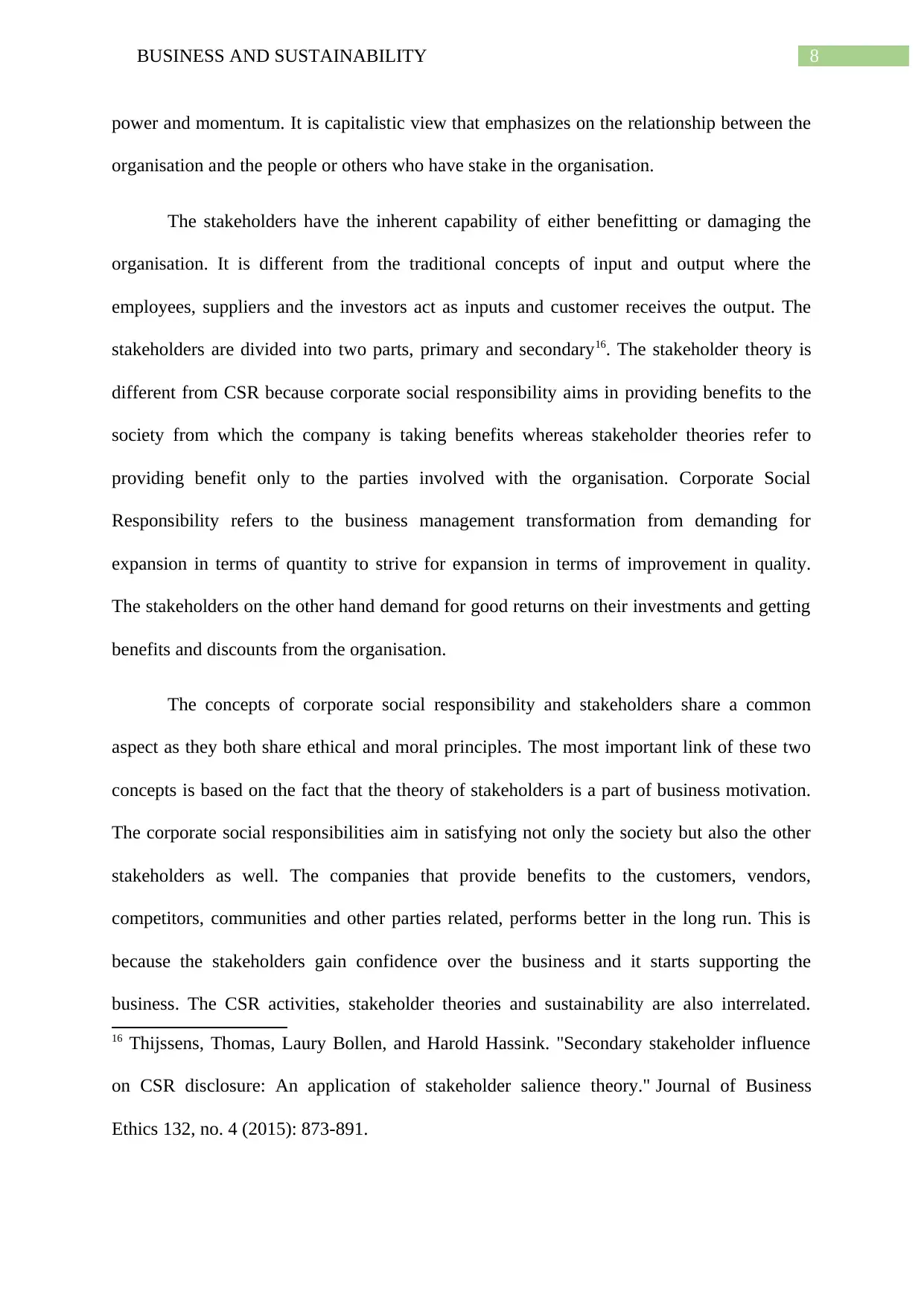
8BUSINESS AND SUSTAINABILITY
power and momentum. It is capitalistic view that emphasizes on the relationship between the
organisation and the people or others who have stake in the organisation.
The stakeholders have the inherent capability of either benefitting or damaging the
organisation. It is different from the traditional concepts of input and output where the
employees, suppliers and the investors act as inputs and customer receives the output. The
stakeholders are divided into two parts, primary and secondary16. The stakeholder theory is
different from CSR because corporate social responsibility aims in providing benefits to the
society from which the company is taking benefits whereas stakeholder theories refer to
providing benefit only to the parties involved with the organisation. Corporate Social
Responsibility refers to the business management transformation from demanding for
expansion in terms of quantity to strive for expansion in terms of improvement in quality.
The stakeholders on the other hand demand for good returns on their investments and getting
benefits and discounts from the organisation.
The concepts of corporate social responsibility and stakeholders share a common
aspect as they both share ethical and moral principles. The most important link of these two
concepts is based on the fact that the theory of stakeholders is a part of business motivation.
The corporate social responsibilities aim in satisfying not only the society but also the other
stakeholders as well. The companies that provide benefits to the customers, vendors,
competitors, communities and other parties related, performs better in the long run. This is
because the stakeholders gain confidence over the business and it starts supporting the
business. The CSR activities, stakeholder theories and sustainability are also interrelated.
16 Thijssens, Thomas, Laury Bollen, and Harold Hassink. "Secondary stakeholder influence
on CSR disclosure: An application of stakeholder salience theory." Journal of Business
Ethics 132, no. 4 (2015): 873-891.
power and momentum. It is capitalistic view that emphasizes on the relationship between the
organisation and the people or others who have stake in the organisation.
The stakeholders have the inherent capability of either benefitting or damaging the
organisation. It is different from the traditional concepts of input and output where the
employees, suppliers and the investors act as inputs and customer receives the output. The
stakeholders are divided into two parts, primary and secondary16. The stakeholder theory is
different from CSR because corporate social responsibility aims in providing benefits to the
society from which the company is taking benefits whereas stakeholder theories refer to
providing benefit only to the parties involved with the organisation. Corporate Social
Responsibility refers to the business management transformation from demanding for
expansion in terms of quantity to strive for expansion in terms of improvement in quality.
The stakeholders on the other hand demand for good returns on their investments and getting
benefits and discounts from the organisation.
The concepts of corporate social responsibility and stakeholders share a common
aspect as they both share ethical and moral principles. The most important link of these two
concepts is based on the fact that the theory of stakeholders is a part of business motivation.
The corporate social responsibilities aim in satisfying not only the society but also the other
stakeholders as well. The companies that provide benefits to the customers, vendors,
competitors, communities and other parties related, performs better in the long run. This is
because the stakeholders gain confidence over the business and it starts supporting the
business. The CSR activities, stakeholder theories and sustainability are also interrelated.
16 Thijssens, Thomas, Laury Bollen, and Harold Hassink. "Secondary stakeholder influence
on CSR disclosure: An application of stakeholder salience theory." Journal of Business
Ethics 132, no. 4 (2015): 873-891.
⊘ This is a preview!⊘
Do you want full access?
Subscribe today to unlock all pages.

Trusted by 1+ million students worldwide
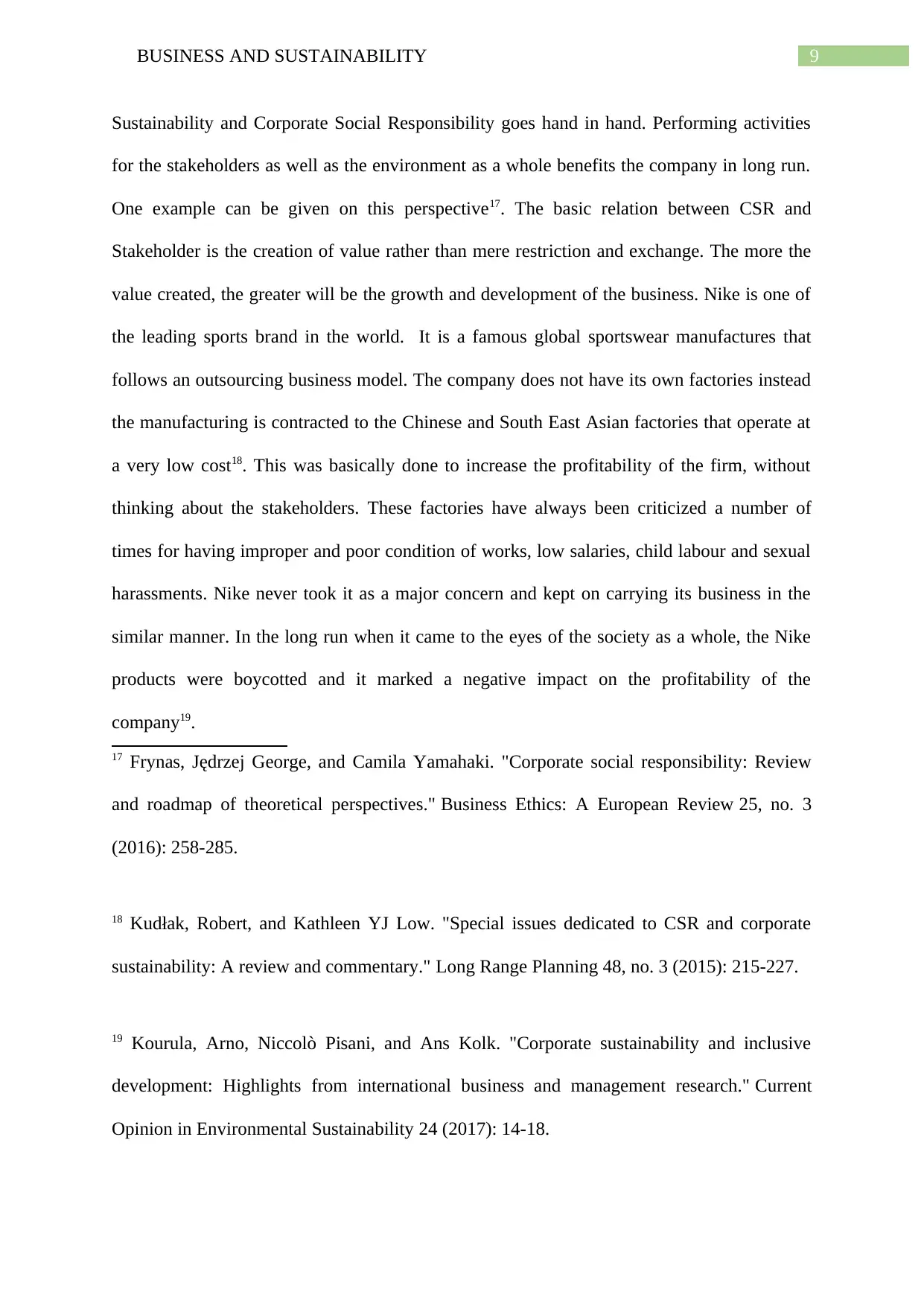
9BUSINESS AND SUSTAINABILITY
Sustainability and Corporate Social Responsibility goes hand in hand. Performing activities
for the stakeholders as well as the environment as a whole benefits the company in long run.
One example can be given on this perspective17. The basic relation between CSR and
Stakeholder is the creation of value rather than mere restriction and exchange. The more the
value created, the greater will be the growth and development of the business. Nike is one of
the leading sports brand in the world. It is a famous global sportswear manufactures that
follows an outsourcing business model. The company does not have its own factories instead
the manufacturing is contracted to the Chinese and South East Asian factories that operate at
a very low cost18. This was basically done to increase the profitability of the firm, without
thinking about the stakeholders. These factories have always been criticized a number of
times for having improper and poor condition of works, low salaries, child labour and sexual
harassments. Nike never took it as a major concern and kept on carrying its business in the
similar manner. In the long run when it came to the eyes of the society as a whole, the Nike
products were boycotted and it marked a negative impact on the profitability of the
company19.
17 Frynas, Jędrzej George, and Camila Yamahaki. "Corporate social responsibility: Review
and roadmap of theoretical perspectives." Business Ethics: A European Review 25, no. 3
(2016): 258-285.
18 Kudłak, Robert, and Kathleen YJ Low. "Special issues dedicated to CSR and corporate
sustainability: A review and commentary." Long Range Planning 48, no. 3 (2015): 215-227.
19 Kourula, Arno, Niccolò Pisani, and Ans Kolk. "Corporate sustainability and inclusive
development: Highlights from international business and management research." Current
Opinion in Environmental Sustainability 24 (2017): 14-18.
Sustainability and Corporate Social Responsibility goes hand in hand. Performing activities
for the stakeholders as well as the environment as a whole benefits the company in long run.
One example can be given on this perspective17. The basic relation between CSR and
Stakeholder is the creation of value rather than mere restriction and exchange. The more the
value created, the greater will be the growth and development of the business. Nike is one of
the leading sports brand in the world. It is a famous global sportswear manufactures that
follows an outsourcing business model. The company does not have its own factories instead
the manufacturing is contracted to the Chinese and South East Asian factories that operate at
a very low cost18. This was basically done to increase the profitability of the firm, without
thinking about the stakeholders. These factories have always been criticized a number of
times for having improper and poor condition of works, low salaries, child labour and sexual
harassments. Nike never took it as a major concern and kept on carrying its business in the
similar manner. In the long run when it came to the eyes of the society as a whole, the Nike
products were boycotted and it marked a negative impact on the profitability of the
company19.
17 Frynas, Jędrzej George, and Camila Yamahaki. "Corporate social responsibility: Review
and roadmap of theoretical perspectives." Business Ethics: A European Review 25, no. 3
(2016): 258-285.
18 Kudłak, Robert, and Kathleen YJ Low. "Special issues dedicated to CSR and corporate
sustainability: A review and commentary." Long Range Planning 48, no. 3 (2015): 215-227.
19 Kourula, Arno, Niccolò Pisani, and Ans Kolk. "Corporate sustainability and inclusive
development: Highlights from international business and management research." Current
Opinion in Environmental Sustainability 24 (2017): 14-18.
Paraphrase This Document
Need a fresh take? Get an instant paraphrase of this document with our AI Paraphraser
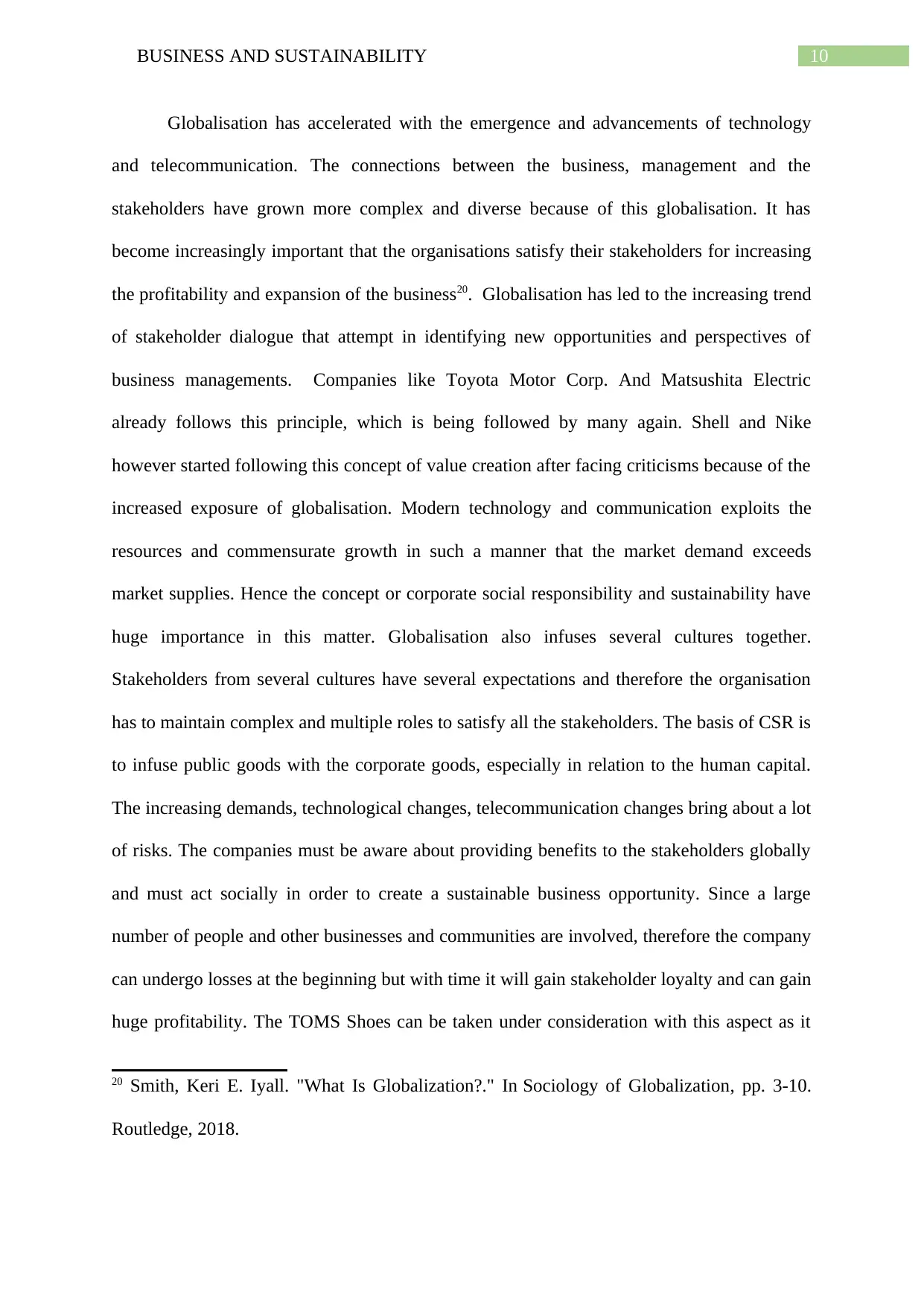
10BUSINESS AND SUSTAINABILITY
Globalisation has accelerated with the emergence and advancements of technology
and telecommunication. The connections between the business, management and the
stakeholders have grown more complex and diverse because of this globalisation. It has
become increasingly important that the organisations satisfy their stakeholders for increasing
the profitability and expansion of the business20. Globalisation has led to the increasing trend
of stakeholder dialogue that attempt in identifying new opportunities and perspectives of
business managements. Companies like Toyota Motor Corp. And Matsushita Electric
already follows this principle, which is being followed by many again. Shell and Nike
however started following this concept of value creation after facing criticisms because of the
increased exposure of globalisation. Modern technology and communication exploits the
resources and commensurate growth in such a manner that the market demand exceeds
market supplies. Hence the concept or corporate social responsibility and sustainability have
huge importance in this matter. Globalisation also infuses several cultures together.
Stakeholders from several cultures have several expectations and therefore the organisation
has to maintain complex and multiple roles to satisfy all the stakeholders. The basis of CSR is
to infuse public goods with the corporate goods, especially in relation to the human capital.
The increasing demands, technological changes, telecommunication changes bring about a lot
of risks. The companies must be aware about providing benefits to the stakeholders globally
and must act socially in order to create a sustainable business opportunity. Since a large
number of people and other businesses and communities are involved, therefore the company
can undergo losses at the beginning but with time it will gain stakeholder loyalty and can gain
huge profitability. The TOMS Shoes can be taken under consideration with this aspect as it
20 Smith, Keri E. Iyall. "What Is Globalization?." In Sociology of Globalization, pp. 3-10.
Routledge, 2018.
Globalisation has accelerated with the emergence and advancements of technology
and telecommunication. The connections between the business, management and the
stakeholders have grown more complex and diverse because of this globalisation. It has
become increasingly important that the organisations satisfy their stakeholders for increasing
the profitability and expansion of the business20. Globalisation has led to the increasing trend
of stakeholder dialogue that attempt in identifying new opportunities and perspectives of
business managements. Companies like Toyota Motor Corp. And Matsushita Electric
already follows this principle, which is being followed by many again. Shell and Nike
however started following this concept of value creation after facing criticisms because of the
increased exposure of globalisation. Modern technology and communication exploits the
resources and commensurate growth in such a manner that the market demand exceeds
market supplies. Hence the concept or corporate social responsibility and sustainability have
huge importance in this matter. Globalisation also infuses several cultures together.
Stakeholders from several cultures have several expectations and therefore the organisation
has to maintain complex and multiple roles to satisfy all the stakeholders. The basis of CSR is
to infuse public goods with the corporate goods, especially in relation to the human capital.
The increasing demands, technological changes, telecommunication changes bring about a lot
of risks. The companies must be aware about providing benefits to the stakeholders globally
and must act socially in order to create a sustainable business opportunity. Since a large
number of people and other businesses and communities are involved, therefore the company
can undergo losses at the beginning but with time it will gain stakeholder loyalty and can gain
huge profitability. The TOMS Shoes can be taken under consideration with this aspect as it
20 Smith, Keri E. Iyall. "What Is Globalization?." In Sociology of Globalization, pp. 3-10.
Routledge, 2018.
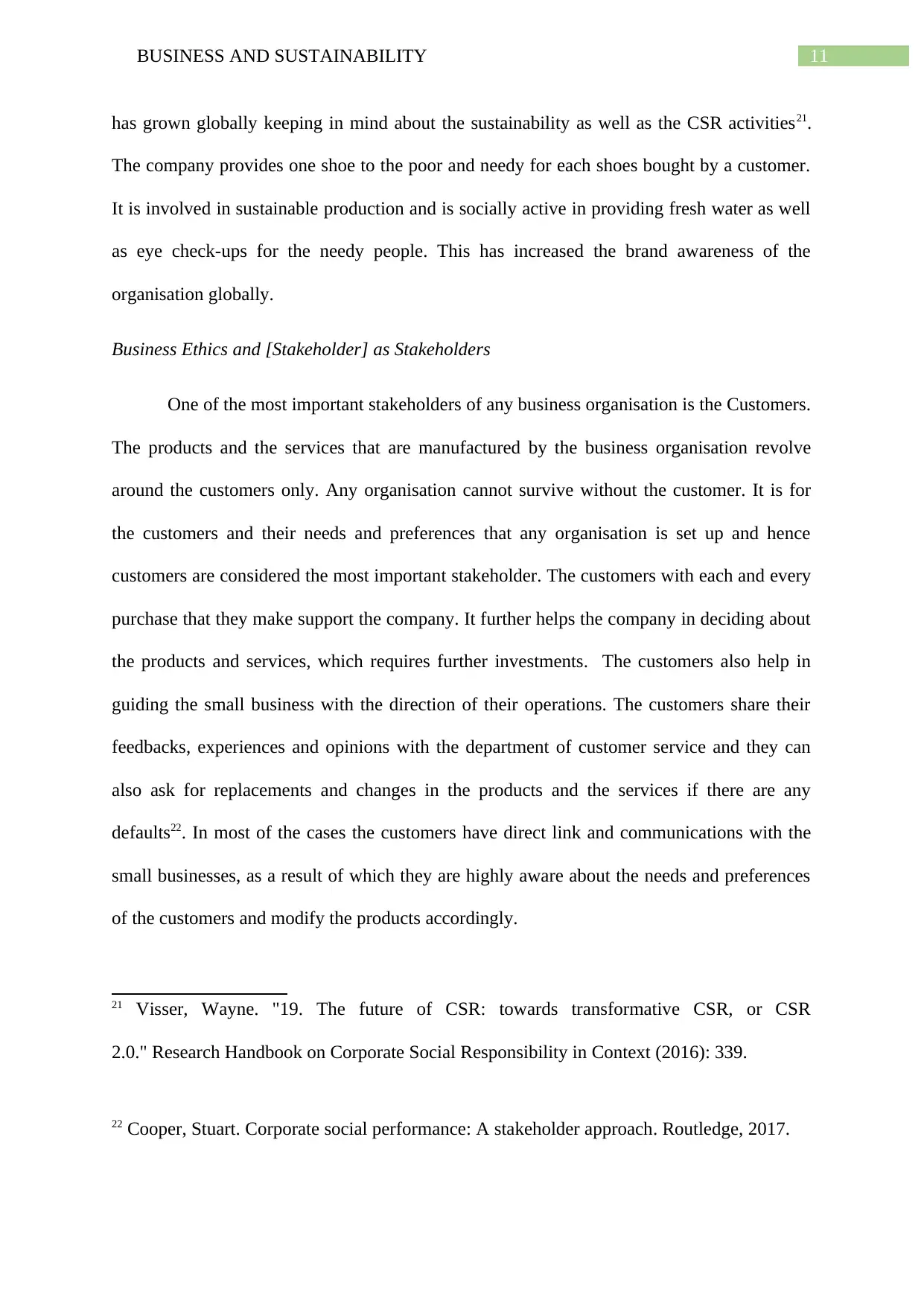
11BUSINESS AND SUSTAINABILITY
has grown globally keeping in mind about the sustainability as well as the CSR activities21.
The company provides one shoe to the poor and needy for each shoes bought by a customer.
It is involved in sustainable production and is socially active in providing fresh water as well
as eye check-ups for the needy people. This has increased the brand awareness of the
organisation globally.
Business Ethics and [Stakeholder] as Stakeholders
One of the most important stakeholders of any business organisation is the Customers.
The products and the services that are manufactured by the business organisation revolve
around the customers only. Any organisation cannot survive without the customer. It is for
the customers and their needs and preferences that any organisation is set up and hence
customers are considered the most important stakeholder. The customers with each and every
purchase that they make support the company. It further helps the company in deciding about
the products and services, which requires further investments. The customers also help in
guiding the small business with the direction of their operations. The customers share their
feedbacks, experiences and opinions with the department of customer service and they can
also ask for replacements and changes in the products and the services if there are any
defaults22. In most of the cases the customers have direct link and communications with the
small businesses, as a result of which they are highly aware about the needs and preferences
of the customers and modify the products accordingly.
21 Visser, Wayne. "19. The future of CSR: towards transformative CSR, or CSR
2.0." Research Handbook on Corporate Social Responsibility in Context (2016): 339.
22 Cooper, Stuart. Corporate social performance: A stakeholder approach. Routledge, 2017.
has grown globally keeping in mind about the sustainability as well as the CSR activities21.
The company provides one shoe to the poor and needy for each shoes bought by a customer.
It is involved in sustainable production and is socially active in providing fresh water as well
as eye check-ups for the needy people. This has increased the brand awareness of the
organisation globally.
Business Ethics and [Stakeholder] as Stakeholders
One of the most important stakeholders of any business organisation is the Customers.
The products and the services that are manufactured by the business organisation revolve
around the customers only. Any organisation cannot survive without the customer. It is for
the customers and their needs and preferences that any organisation is set up and hence
customers are considered the most important stakeholder. The customers with each and every
purchase that they make support the company. It further helps the company in deciding about
the products and services, which requires further investments. The customers also help in
guiding the small business with the direction of their operations. The customers share their
feedbacks, experiences and opinions with the department of customer service and they can
also ask for replacements and changes in the products and the services if there are any
defaults22. In most of the cases the customers have direct link and communications with the
small businesses, as a result of which they are highly aware about the needs and preferences
of the customers and modify the products accordingly.
21 Visser, Wayne. "19. The future of CSR: towards transformative CSR, or CSR
2.0." Research Handbook on Corporate Social Responsibility in Context (2016): 339.
22 Cooper, Stuart. Corporate social performance: A stakeholder approach. Routledge, 2017.
⊘ This is a preview!⊘
Do you want full access?
Subscribe today to unlock all pages.

Trusted by 1+ million students worldwide
1 out of 17
Related Documents
Your All-in-One AI-Powered Toolkit for Academic Success.
+13062052269
info@desklib.com
Available 24*7 on WhatsApp / Email
![[object Object]](/_next/static/media/star-bottom.7253800d.svg)
Unlock your academic potential
Copyright © 2020–2026 A2Z Services. All Rights Reserved. Developed and managed by ZUCOL.





